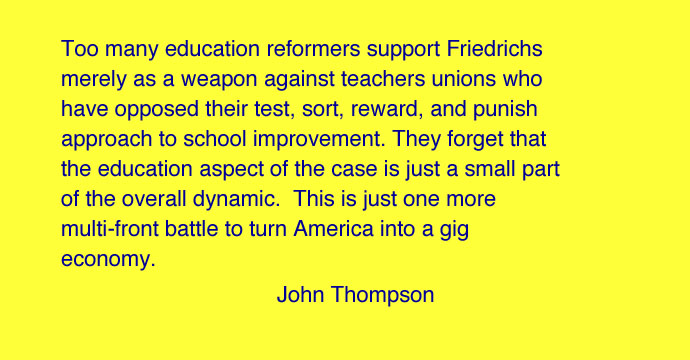Will the Friedrichs Case Turn Teaching into Just Another Gig?

By John Thompson.
Linguist Geoff Nunberg announced his word of the year on NPR’s Fresh Air, and he nailed it. Nunberg’s choice is “Gig.” For over a century, “gig was a slang term for a musician’s date or engagement.” In the 1950s, hipsters and the Beats used the term for “any job you took to keep body and soul together while your real life was elsewhere.” Nunberg explains, “A gig was a commitment you felt free to walk away from as soon as you had $50 in your pocket.”
Nunberg explains that it was easy to embrace such a gig when a person had access to a “‘real job’” which was “permanent, well-paid and with benefits.” Thanks to the New Deal, strong unions and the postwar boom, he recalls, the 1950s and 1960s’ were “America’s moment.” Now, some Millennials refer to their jobs as gigs. Some do so because they have the “luxury reserved for people who can pretend they don’t need one [a job].” Most young workers still need careers, but gigs are often the best they can get. Working people must cobble “a livelihood cleaning apartments, delivering groceries and doing other people’s laundry.”
The U.S. Supreme Court is supposed to be the opposite of a gig. American constitutionalism was founded on a commitment to deeper, time-proven principles of law and justice. “America’s moment” was not shared by everyone, but the Warren Court was devoted to turning American democracy into more than a gig for the privileged. It extended American rights to all, regardless of race, religion, or wealth. Other justices opposed the broad construction philosophy of liberals such as Earl Warren and they made the case that judicial activism went too far. But, too many of today’s conservatives are treating the law of the land as a gig, as a Will the Friedrichs Case Turn Teaching into Just Another Gig? - Living in Dialogue:
